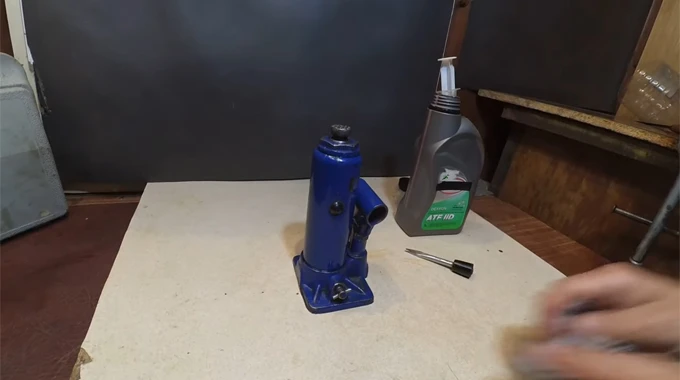Last Updated on April 19, 2023
Having a hydraulic jack around is handy when you need to lift a big object. But you need to oil the jack to keep it functioning properly. After you reach the jack refill, you realize no hydraulic oil is left. Only compressor oil remains. So, can you use compressor oil in a hydraulic jack?
Although hydraulic jacks and compressors rely on oil for proper operation, it is not recommended to use compressor oil in hydraulic jacks. Oil is designed for compressors and may not be compatible with the seals and other components in a hydraulic jack.
Furthermore, the additives in compressor oil may not be suitable for use in a hydraulic system. So, what should you do if you’re out of hydraulic oil? Read on to find out.
How Can I Use Compressor Oil In a Hydraulic Jack?

Though it is not recommended, you could try using compressor oil if you are in a bind. But be aware that the oil may not last as long as hydraulic oil and will need to be replaced more frequently. For a certain period, follow these steps:
- Set Hydraulic Jack on Even Ground: At first, you should set the jack on an even surface to avoid any accidents. Make sure that the object you are trying to lift is also on an even and stable surface. The surface or place can be a table, the ground, or any other firm and level place.
- Check The Jack’s Capacity: You must check the capacity of your jack before using it. The maximum weight that your particular jack can lift is usually mentioned in the user manual. Do not try to exceed this limit, as it may damage the jack or injure you.
- Fill the Reservoir with Compressor Oil: Next, unscrew the reservoir cap and fill it with compressor oil. Do not overfill, as this can cause the oil to leak out. Once you have filled the reservoir, screw the cap back on tightly.
- Pump The Jack Handle: Start pumping the jack handle to start lifting the object. If the heavy object is heavy, you may need to pump the handle several times before it starts lifting. Keep pumping until the object has reached the desired height.
- Lower The Object Slowly: When you are finished, lower the object slowly by releasing the pressure on the jack handle. If you release the pressure too quickly, the object may fall and become damaged or injure someone.
- Replace The Compressor Oil: Remember to replace the compressor oil when you have hydraulic oil on hand. Since compressor oil is not as heat-resistant as hydraulic oil, it could cause seal failure or other damage over time.
Again we say that these tips are only for temporary use, not for the long term. It is always better to use the proper hydraulic oil for your jack.
What’s the Difference between Compressor Oil and Hydraulic Jack Oil?
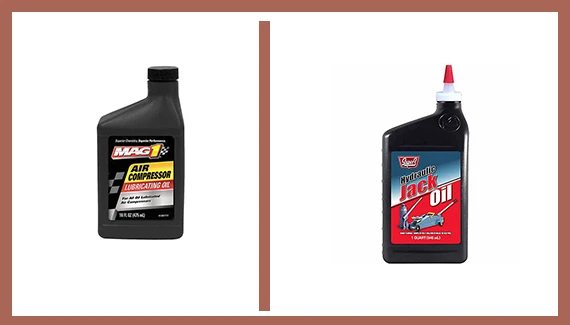
Though they may appear to be similar, they serve different purposes. There are some key differences between them:
Additives
Compressor oil is designed specifically for use in air compressors. It helps to lubricate the moving parts and keep them functioning properly.
Hydraulic jack oil, on the other hand, is used in hydraulic jacks. This type of oil is thicker than compressor oil and contains additives that help to protect against wear and tear. And it is not suitable for use in air compressors.
Viscosity
Compressor oil has a lower viscosity than hydraulic jack oil. This means that it is thinner and less likely to gum up the moving parts in an air compressor.
On the other hand, Hydraulic jack oil is thicker and designed to withstand the high pressures found in hydraulic systems.
Performance
Each oil is designed for a specific purpose and will perform best when used as intended. Compressor oil is designed for air compressors, which will help prolong the compressor’s life by lubricating the moving parts.
Hydraulic jack oil is designed for use in hydraulic jacks, where it will protect the system from wear and tear.
Compatibility
Compressor oil and hydraulic jack oil are not interchangeable. They are not compatible with each other and should not be used in the same system.
Using the wrong oil can damage your air compressor or hydraulic jack. It can also void your warranty. Plus, it can be a safety hazard.
So, if you need to apply compressor oil to a hydraulic jack for a short period, follow the steps above. But remember, it’s always best to use the proper oil for your equipment.
Is There a Substitute for Hydraulic Jack Oil? Explore the Available Options
If you do not have hydraulic jack oil, then you should look at the other oils that are available as substitutes.
It will be helpful if you know what substitute to use when you lack hydraulic jack oil and your vehicle needs to be lifted. The following are some alternatives to hydraulic jack oil that are commonly used:
1. Power Steering Fluid
One of the most common substitutes for hydraulic jack oil is power steering fluid. The power steering fluid is a hydraulic oil that is used to transmit the power in a power steering system. Fluid is used in the power steering system to create pressure that assists in turning the wheels.
Also, the fluid acts as a lubricant and helps to keep the system cool. Although power steering fluid is not the same as hydraulic jack oil, it can still be used in an emergency.
At 40 degrees Celsius, the viscosity of power steering fluid is approximately 35 centistokes, whereas hydraulic jack oil has a viscosity of 22 to 32 centistokes.
Due to the power steering fluid and jack oil’s relatively similar viscosities, there should be no compatibility issue. It is possible to obtain fairly similar performance from power steering fluid.
2. Engine Oil
Hydraulic jack oil can also be substituted with engine oil. Various grades of engine oil are available. That’s why you have to be more careful when choosing engine oil as a replacement for hydraulic jack oil.
Knowing what type of oil is used in your hydraulic system is important. The most common oil used in hydraulic jacks is mineral oil of ISO grade 32, 46, or 68. Based on this information, you need to choose a compatible engine oil.
For example, if your hydraulic jack uses ISO 32 oil, then you can use SAE 10 engine oil as a replacement. Similarly, SAE 20 engine oil is suitable for ISO 46, and SAE 30 engine oil is compatible with ISO 68.
Your hydraulic jack will perform well if you use engine oil according to the recommendations above. Be sure to check your jack’s owner’s manual for specific oil recommendations. This will allow you to select the most compatible oil.
3. ATF (Automatic Transmission Fluid)
Like power steering fluid and engine oil, automatic transmission fluid (ATF) can also be used as a substitute for hydraulic jack oil. ATF is a hydraulic fluid used in automatic transmissions. This type of fluid is also used to lubricate moving parts in the transmission.
There are a few reasons that ATF can be substituted for hydraulic jack oil. As ATF is designed to withstand high temperatures, it will not degrade under the same conditions as hydraulic jack oil. There is less likelihood of foaming with ATF, which provides more consistent pressure support.
4. Compressor Oil
You can also use compressor oil because there is some similarity between hydraulic jack oil and compressor oil. Like hydraulic jack oil, compressor oil contains no detergents.
Hydraulic jack oil is also similar to 20-weight or 30-weight compressor oils. As a replacement for hydraulic jack oil, you may use any of these oils.
When using compressor oil, make sure you do not use more than what is required. Too much oil in the system can cause problems. Overfilling will result in foaming, which will reduce the hydraulic jack’s effectiveness.
5. Turbine Oil
The use of turbine oil can be a great substitute for hydraulic jacks for a number of reasons. Turbine oil is capable of withstanding high temperatures and pressures, making it ideal for use in a hydraulic jack.
Since turbine oil is highly resistant to degradation, it will maintain its performance over time. Hydraulic jacks benefit from turbine oil because it minimizes friction and wears.
In contrast to hydraulic jack oil, turbine oil does not degrade when subjected to the same conditions. It is safe to use turbine oil, knowing that there will be no adverse effects.
6. Vegetable Oil:
Vegetable oil can be used to replace hydraulic jack oil, but it will not work as effectively. Lubricity, thermal stability, and oxidative stability are the main properties required for a potential hydraulic fluid.
In general, vegetable oils have good lubricity, which refers to the ability to reduce friction and wear between surfaces. The thermal stability of vegetable oils is also generally quite good, meaning that they can withstand high temperatures without breaking down.
But, their oxidative stability is not as good as that of mineral oils, and they also have poor low-temperature flow behavior. For these reasons, vegetable oils are not commonly used as hydraulic fluids.
Advantages of Using Power Steering Fluid in A Floor Jack

Pumping power steering fluid in a floor jack can bring numerous advantages and make it easier to use the jack safely and efficiently.
1. Increase Hydraulic Efficiency
Using power steering fluid with similar viscosities in a floor jack can Increase hydraulic efficiency. Power steering fluid is designed to withstand high pressure, providing more significant force than other fluids at higher pressures.
This increased force gives the user more control and accuracy when operating the jack, which can help improve the speed and accuracy of any job.
2. Improved Heat Dissipation Capabilities
Power steering fluids are designed to dissipate heat quickly and evenly throughout the system. This keeps all components of the floor jack running at optimal temperatures during operation for improved performance and longevity.
It reduces risks caused by excessive temperatures, such as melting or cracking seals or components due to rapid expansion by temperature fluctuations. By providing better thermal efficiency than other lubricants or fluids used in floor jacks, it can simultaneously increase operational speeds.
3: Prevents Corrosion
Using power steering fluid (PSF) in floor jacks is a great way to protect them from corrosion. These machines, especially when exposed to harsh environmental conditions like dust, moisture, and salt air, can corrode metal surfaces quickly if not properly protected. Power steering fluid helps to prevent this from happening.
PSF has excellent lubrication properties that make it ideal for preventing corrosion and oxidation inside a floor jack. It helps to ensure all components remain well lubricated and work smoothly regardless of how often you use them.
4: Suitable For Long Time Use
Use power steering fluid as part of your routine maintenance for floor jacks. This type of lubrication will help ensure that your equipment stays safe and reliable, even after long periods of use.
The viscosity index is high, so it won’t easily break down like other hydraulic oils. It also gives you better control when using intense workloads at very high temperatures. This form of lubrication offers improved film strength compared with regular mineral hydrocarbons.
Disadvantages of Using Incompatible Power Steering Fluid in a Floor Jack
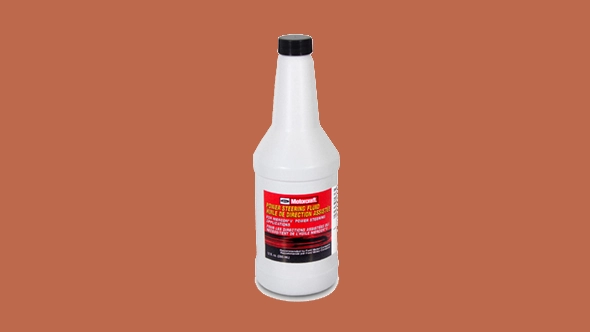
Using incompatible power steering oil in a hydraulic floor jack can have two disadvantages. It can damage or break down parts and lead to degraded performance.
1. May Damage the Jack With Incompatible Additives
Incompatible additives in some power steering fluids can cause damage to a floor jack over time. These substances soften or break down the rubber parts that make up internal seals, leading to cracks and leaks.
As a result, introducing power steering fluids with incompatible additives into a floor jack can also greatly reduce its lifespan.
2. May Degrade Performance:
If you don’t use the right hydraulic power steering fluid in your floor jack, it could have some pretty bad consequences like degraded performance.
Over time, the different viscosities of fluids can cause them to leak out from places they shouldn’t be leaking from, like seals or gaskets. When this happens, you’ll lose pressure and speed in your system.
What Type of Oil Is Compressor Oil?
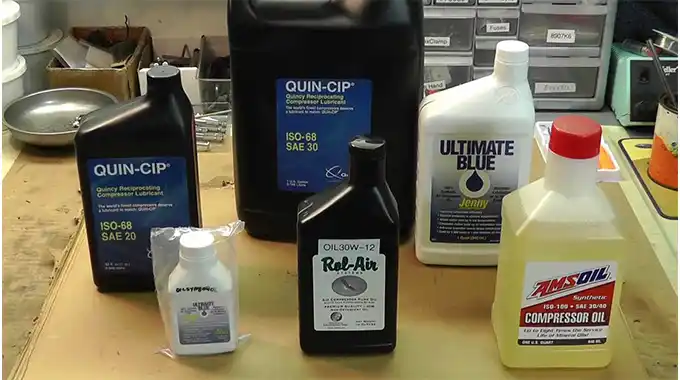
Mineral oil is the most common type of oil used in air compressors. It is derived from petroleum refining and has good lubricating properties. And it does not dissipate heat as well as synthetic oils. Therefore, some manufacturers recommend using synthetic oils made in labs.
The heat-dissipating properties of synthetic oils can prolong the life of your air compressor. When choosing an oil for your compressor, consult your owner’s manual to see if the manufacturer recommends a specific type.
Synthetic oil may be better if you use your air compressor frequently or in extreme temperatures. Otherwise, mineral oil should suffice. But none of them are recommended for use in a hydraulic jack.
What Oil Is Used In Hydraulic Systems?
Non-compressible hydraulic oil helps to transfer power within the system. It can be either synthetic- or mineral-based, though most hydraulic oils are mineral-based.
Hydraulic oil has several properties that make it ideal for hydraulic systems, including a high viscosity index, a low pour point, and good oxidation stability.
It will maintain its consistency and performance even in extreme temperatures. Foaming and corrosion are also resistant to hydraulic oil.
What Viscosity Is Hydraulic Jack Oil?
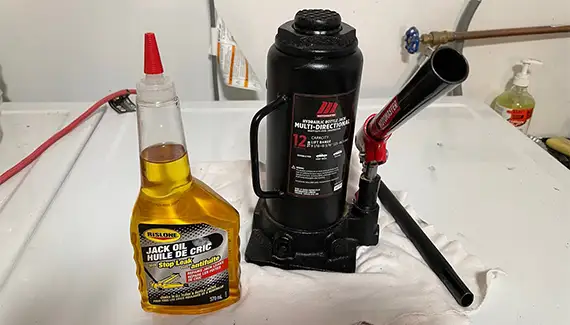
When operating hydraulic jacks and hoists, hydraulic jack oil viscosity is important. The oil must be viscous enough to lubricate the components but not so viscous that it causes damage. Hydraulic jack oil should have a viscosity between 22 and 32 cSt at 40°C.
This viscosity range ensures that the oil will lubricate the components without causing damage. If the oil’s viscosity is too low, it will not lubricate the components properly and can cause damage.
If the viscosity is too high, it can cause wear on the components and can also cause damage. Maintaining the proper viscosity is essential for the smooth operation of the hydraulic jack and hoists.
What Is the Viscosity of Compressor Oil?
The viscosity of a fluid is a measure of its resistance to flow. In other words, it measures how thick or viscous the fluid is. Most compressor lubricants have a viscosity of 32. cSt to 220 cSt. The higher the viscosity, the thicker the fluid, and the greater the resistance to flow.
For example, honey has a high viscosity, while water has a low viscosity. Compressor oils fall somewhere in between these two extremes. The viscosity of compressor oil is important because it affects the amount of oil required for proper lubrication.
Too much oil can cause fouling and deposits, while too little oil can cause wear and premature failure. The manufacturer will specify the correct viscosity for your compressor. It’s okay to use thick compressor oil for hydraulic jacks for a short time, but not for long.
What Viscosity is Power Steering Fluid?
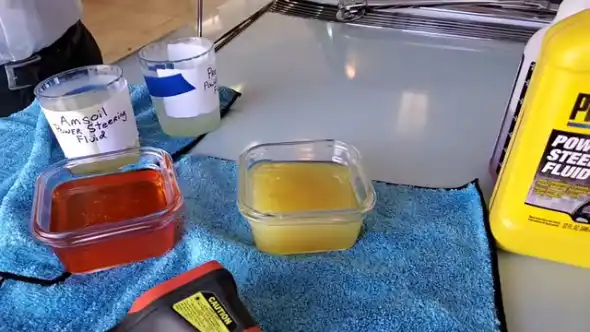
Power steering fluid typically has a viscosity of between 35.0 cSt and 7.10 cSt @ 40°C and 100°C, respectively, with a viscosity Index of 171. So it is less viscous at higher temperatures than at lower temperatures.
Can You Use 10W30 as Hydraulic Oil?
You can use 10W30 as hydraulic oil in a floor jack, but it should only be done when the engine is hot. Since this type of oil may not provide adequate lubrication when cold temperatures set in.
When using this type of oil, make sure that you check your pressure levels regularly and adjust them accordingly depending on conditions such as temperature.
Can I Use Brake Fluid In A Hydraulic Jack?
The use of brake fluid for a hydraulic jack is not permitted. The brake fluid is not able to withstand the high temperatures that are needed for the jack. This can pose a safety risk, as the brake fluid may boil and cause the jack to fail.
The brake fluid will break down over time and need to be replaced more frequently. For the best results, use hydraulic fluid designed specifically for your jack, and do not use brake fluid.
Can the Substitute for Hydraulic Jack Oil Provide the Same Level of Performance?
While you can substitute a variety of oils for hydraulic jack oil, not all will perform equally well. Hydraulic jack oil is typically designed to resist foaming and maintain a high level of viscosity at high temperatures. This ensures that the oil will continue to flow freely, even under heavy loads.
Due to this, it can provide superior performance in terms of lifting capacity and stability. Even if the right substitute oils provide relatively good performance, they can leave a little void compared to hydraulic jack oil.
It is always recommended that you use hydraulic jack oil designed specifically for that purpose. You should only use substitute oils when it is not possible to obtain the proper hydraulic jack oil.
How Often Should You Change Hydraulic Jack Oil?
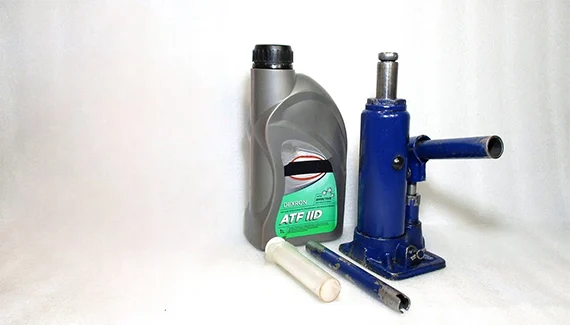
Over time, the oil will start to break down and need to be changed. Depending on how often you use your jack, you may need to change the oil as often as every year or two. If you notice any leaking or poor performance, check the oil level and add more if needed.
There are a few other signs that it’s time to change the hydraulic jack oil:
- If the fluid looks dirty or cloudy, it’s time to change.
- You should also make a fresh batch if the fluid starts foaming.
- Changing the oil if the jack makes strange sounds or malfunctions is also a good idea.
By changing the oil regularly, you can extend the life of your hydraulic jack and keep it running smoothly.
Can You Use Compressor Oil in a Bottle Jack?
A bottle jack is a kind of hydraulic jack. So yes, you can use compressor oil in a bottle jack for a short time. But remember, you should always use the right oil for your equipment.
Because if you run a bottle jack on compressor oil for a long time, it will damage the seals and O-rings, causing the jack to leak fluid and potentially fail. For this reason, it is essential to use hydraulic fluid with a bottle jack.
Safely Use Hydraulic Jack With Substitute Oil
So now you know that you can put compressor oil in a hydraulic jack, but it’s not recommended. With our above advice, you can keep any hydraulic jack running smoothly. Just be sure to check the fluid regularly and change it when needed.
As you can see, a few substitutes can be used for hydraulic jack oil. While they will not meet the same performance standards, they can still do the job in a pinch.
When using substitute oils, ensure you use the proper amount and do not overfill the system. Too much oil can cause problems, such as foaming, which can reduce the effectiveness of the hydraulic jack.
Using the proper hydraulic fluid for your jack is best, but if you cannot obtain it, any of these substitutes will serve the purpose.
